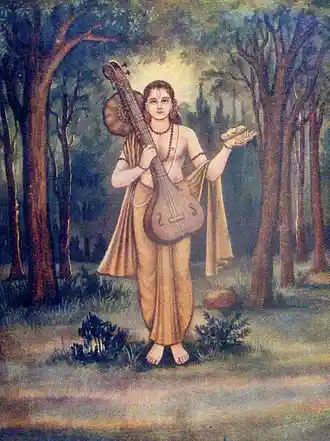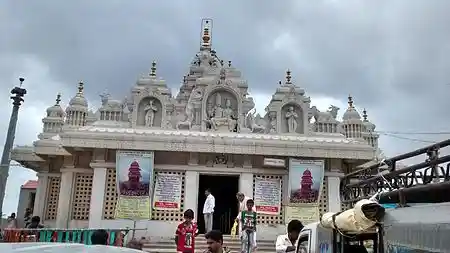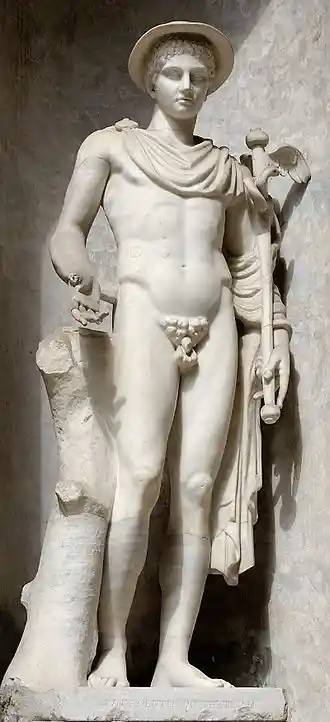THE GODS OF MESSENGER AND TRICKSTER: HERMES AND NARADA
The two oldest mythologies of the world- Greek and Hindu have several similarities that somehow make up an interesting comparison. The trinity of gods, their love stories and legends, mega wars that lasted for years, and many more. If one looks closely, one will find several gods that share similar characteristics in both these mythologies.

Narada. Image Courtesy: Wikimedia Commons
However, Apollo, being the God of prophecy, quickly found out the malicious person who stole his cattle. He put Hermes in front of Zeus for a verdict for his actions. Initially declining the origins of his prank, he later agreed to his nuisance and gave his lyre to Apollo as a gift. Pleased by this action, Apollo shared his gift of prophecy with Hermes and made him his favourite immortal.
These instances portray how Hermes and Narada had the unconditional need to have fun and create trouble in the lives of immortals and mortals alike. Being a part of two different mythologies, they had similar yet different roles to play. Yet, all over the world, they are known for their mischief.
Today, we will focus on one such pair of gods who could be the two sides of the same coin- same yet different in their respective works. In Hindu mythology, we are well aware of the phrase. “Narayan Narayan”. The moment we hear this phrase on any television replica of mythology, we know Narada is about to make an entry.
Who is Narada? Narada, popularly known as Narad Muni, is a god sage who is known to be the first journalist or messenger in Hindu mythology. He is a Manasaputra, or one of the mind-created children of Brahma. With his little tricks, he is known to spice up mythological events with his words of wisdom and his habit of gossip. Since he travels everywhere, he knows everything and faces difficulty keeping all the events and information within him. He loves music and carries a veena with him everywhere he goes. Chanting and singing hymns while engrossed in his thoughts and dreams is how one sees him.
There are various instances throughout Hindu mythology that portray him as a funny guy or a prankster who loves creating trouble. One such famous instance goes back to the story of Krishna when Narad Muni went to Kansa, Krishna’s evil uncle, to tell him that a child would soon be born who was going to kill him. We know what happens later in this popular event. Similarly, he goes and talks to King Daksha, a Prajapati, and a divine king-rishi. During his visit, he meets Haryashvas, the sons of Daksha and convinces them to become a sage and give up their materialistic life. Daksha, angry and insulted, curses Narad Muni by saying that he would travel everywhere in the world. However, there would not be a single place that he would call your home.
Narad Muni has played various roles in Hindu mythology. There were reasons for every such prank of his that was significant for the bigger picture in Hindu mythology. We see a similar god in Greek mythology as well. A prankster and a God of messenger, Hermes is an Olympian deity who was the son of Zeus.
Hermes is the God of messenger and travel. He can travel quickly between the lives of mortals, the realm of divinity, and the world of hell. He is also known as the soul guide, a conductor who takes the departed soul to the afterlife. He is known as the divine trickster, just like Narada, and is majorly mentioned in the Homeric Hymn to Hermes. He too is a patron, of music and is also regarded as the creator of the lyre.
One interesting incident of his famous lyre and his pranking is the one with Apollo. When Hermes was still an infant, he went to Pieria, where Apollo’s cattle were kept. He stole the cattle of Apollo and took them to Pylos while returning to Cyllene, where he was born. He was a smart trickster and made sure to remove the tracks made by the hooves of the cattle. When he returned home, he killed a tortoise and used the shell along with the intestines of some of the cattle to make a lyre, his instrument.

Temple of Narad Muni. Image Courtesy: Wikimedia Commons

Statue of Hermes. Image Courtesy: Wikimedia Commons


